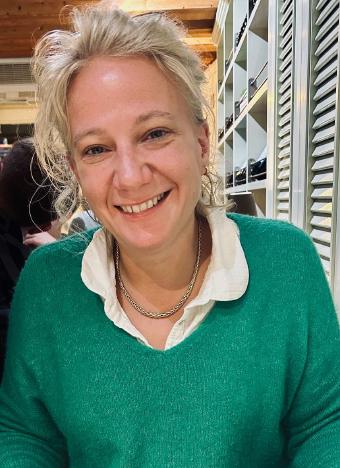
Julie B. FIÉVET
Hybrid vigor and inbreeding depression in Maize
AgroParisTech, Associate Professor
julie.fievet@inrae.fr — 01 69 33 23 58
Génétique Quantitative et Méthodologie de la Sélection
- Génétique Quantitative et Évolution - Le Moulon
- Université Paris-Saclay, INRAE, CNRS, AgroParisTech
- IDEEV
- 12 route 128
- 91190 Gif-sur-Yvette
Position
- Departement of Life Science and Health, Team Evolutionnary Genetics and Plant Breeding, Research conducted in the laboratory Génétique Quantitative et Méthodologie de la Sélection, GQE - Le Moulon
- Co-supervisor of the Master of Engineering Production and Innovation in Plant Systems (PISTv) in AgroParisTech
- Co-supervisor of the T.I.P.E exam (student project of science) for the selective admission process to National Institute of Higher Education in Agricultural and Veterinary Sciences
Education
- Postdoctoral fellow, GQE-Le Moulon (Gif-sur-Yvette, France), 2007
- Postdoctoral fellow, Physiologie Cellulaire Végétale, CEA Grenoble, 2005-2007
- PhD student (MENRT fellowship), UMR Génétique Végétale (Gif-sur-Yvette, France), 2000-2004
Research interests, accomplishment and expertise
-
My current research interests are focus on the phenomenons of hybrid vigor and inbreeding depression. My main objectives are to investigate with a high resolution the genetic determinants of heterosis to address in particular (i) the respective roles played by overdominance and pseudo-overdominance and (ii) the contribution of structural variation (presence absence of genes) to heterosis relatively to other types of polymorphisms. I also investigate to which extent heterosis is related to the combination of complementary adaptation factors in parental materials. My research takes place within the French investment for the future Amaizing program, in which I lead the heterosis task in the WP5 and WP6 (www.amaizing.fr).
-
My past work has been to investigate how the Metabolic Control Theory could lead to a biochemical model of heterosis based on the definition of dominance and overdominance as emergent properties of metabolic systems.
During my postdoctoral fellow in the PCV lab, I’ve worked on the plant response to heavy metal stress in the context of phytoremediation.
Teaching
-
Master of Engineering
- 1st year Population and Quantitative Genetics
- 2nd year Plant Genetics and Breeding ; Plant Adaptation to Abiotic Stresse
- 3rd year Production et Innovation dans les Systèmes Techniques Végétaux (PISTv)
Plant breeding ; Quantitative Genetics ; Population Genetics ; Genome Wide Selection and Association Studies - 3rd year Biotechnologies (BIOTECH)
Quantitavive Genetics ; Biostatistics ; Metabolic Engineering
-
Master of science – Biologie Intégrative et Physiologie / M. Sc degree of the Paris-Saclay University
Genetics and Diversity ; Plant breeding ; Biostatistics -
Bachelor of Science – Institut Villebon Charpak
Population Genetics ; Plant Genetics and Breeding
Publications
- Beugnot A., 07/02/2023, Hybrid performance in maize: from study of complementary between heterotic groups to genomic prediction, PhD, Université Paris-Saclay
- Roth M., Beugnot A., Mary-Huard T., Moreau L., Charcosset A., Fievet JB.. (2022) Improving genomic predictions with inbreeding and non-additive effects in two admixed maize hybrid populations in single and multi-environment contexts. Genetics, iyac018
- de Vienne D., Fiévet J. B. . (2020) The Pitfalls of Heterosis Coefficients. Plants, 7 (9) 875
- Fiévet J. B. , Nidelet T., Dillmann C., de Vienne D.. (2018) Heterosis Is a Systemic Property Emerging From Non-linear Genotype-Phenotype Relationships: Evidence From in Vitro Genetics and Computer Simulations. Front. Genet., (9)
- Larièpe A., Moreau L., Laborde J., Bauland C., Mezmouk S., Décousset L., Mary-Huard T., Fiévet J. B. , Gallais A., Dubreuil P., Charcosset A.. (2017) General and specific combining abilities in a maize (Zea mays L.) test-cross hybrid panel: relative importance of population structure and genetic divergence between parents. Theor. Appl. Genet., 2 (130) 403-417
- Larièpe A., Mangin B., Jasson S., Combes V., Dumas F., Jamin P., Lariagon C., Jolivot D., Madur D., Fiévet J. B. , Gallais A., Dubreuil P., Charcosset A., Moreau L.. (2012) The Genetic Basis of Heterosis: Multiparental Quantitative Trait Loci Mapping Reveals Contrasted Levels of Apparent Overdominance Among Traits of Agronomical Interest in Maize ( Zea mays L.). Genetics, 2 (190) 795-811
- Fiévet J. B. , de Vienne D., Gallais A.. (2011) Heterosis, Inbreeding depression and Hybrid varieties. library.siena.edu,
- Fievet JB., Dillmann C., de Vienne D.. (2010) Systemic properties of metabolic networks lead to an epistasis-based model for heterosis. Theor Appl Genet, 2 (120) 463-73